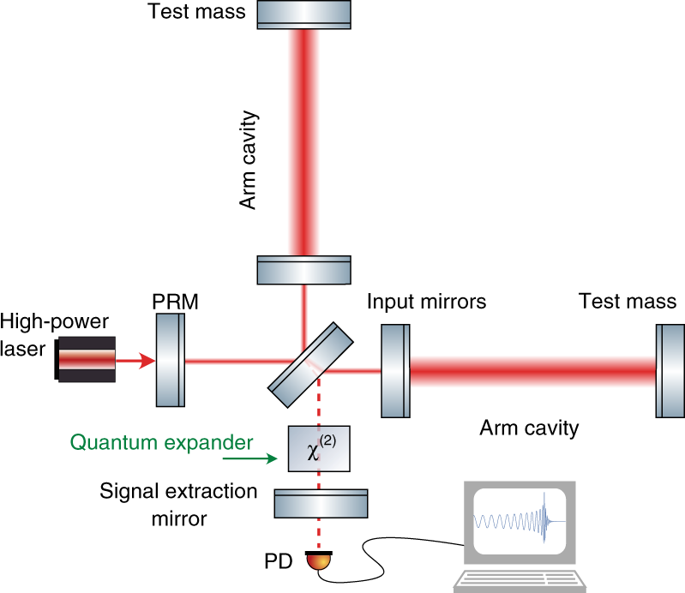当前位置:
X-MOL 学术
›
Light Sci. Appl.
›
论文详情
Our official English website, www.x-mol.net, welcomes your
feedback! (Note: you will need to create a separate account there.)
Quantum expander for gravitational-wave observatories.
Light: Science & Applications ( IF 20.6 ) Pub Date : 2019-12-11 , DOI: 10.1038/s41377-019-0230-2 Mikhail Korobko 1 , Yiqiu Ma 2 , Yanbei Chen 2 , Roman Schnabel 1
Light: Science & Applications ( IF 20.6 ) Pub Date : 2019-12-11 , DOI: 10.1038/s41377-019-0230-2 Mikhail Korobko 1 , Yiqiu Ma 2 , Yanbei Chen 2 , Roman Schnabel 1
Affiliation

|
The quantum uncertainty of laser light limits the sensitivity of gravitational-wave observatories. Over the past 30 years, techniques for squeezing the quantum uncertainty, as well as for enhancing gravitational-wave signals with optical resonators have been invented. Resonators, however, have finite linewidths, and the high signal frequencies that are produced during the highly scientifically interesting ring-down of astrophysical compact-binary mergers still cannot be resolved. Here, we propose a purely optical approach for expanding the detection bandwidth. It uses quantum uncertainty squeezing inside one of the optical resonators, compensating for the finite resonators' linewidths while keeping the low-frequency sensitivity unchanged. This quantum expander is intended to enhance the sensitivity of future gravitational-wave detectors, and we suggest the use of this new tool in other cavity-enhanced metrological experiments.
中文翻译:

引力波天文台的量子扩展器。
激光的量子不确定性限制了重力波天文台的灵敏度。在过去的30年中,已经发明了用于压缩量子不确定性以及利用光学谐振器来增强重力波信号的技术。然而,谐振器具有有限的线宽,并且在天文学的紧凑型二元合并的高度科学化的衰落过程中产生的高信号频率仍然无法解决。在这里,我们提出了一种纯粹的光学方法来扩展检测带宽。它利用压缩一个光谐振器内部的量子不确定性来补偿有限谐振器的线宽,同时保持低频灵敏度不变。这款量子扩展器旨在增强未来引力波探测器的灵敏度,
更新日期:2019-12-11
中文翻译:

引力波天文台的量子扩展器。
激光的量子不确定性限制了重力波天文台的灵敏度。在过去的30年中,已经发明了用于压缩量子不确定性以及利用光学谐振器来增强重力波信号的技术。然而,谐振器具有有限的线宽,并且在天文学的紧凑型二元合并的高度科学化的衰落过程中产生的高信号频率仍然无法解决。在这里,我们提出了一种纯粹的光学方法来扩展检测带宽。它利用压缩一个光谐振器内部的量子不确定性来补偿有限谐振器的线宽,同时保持低频灵敏度不变。这款量子扩展器旨在增强未来引力波探测器的灵敏度,











































 京公网安备 11010802027423号
京公网安备 11010802027423号